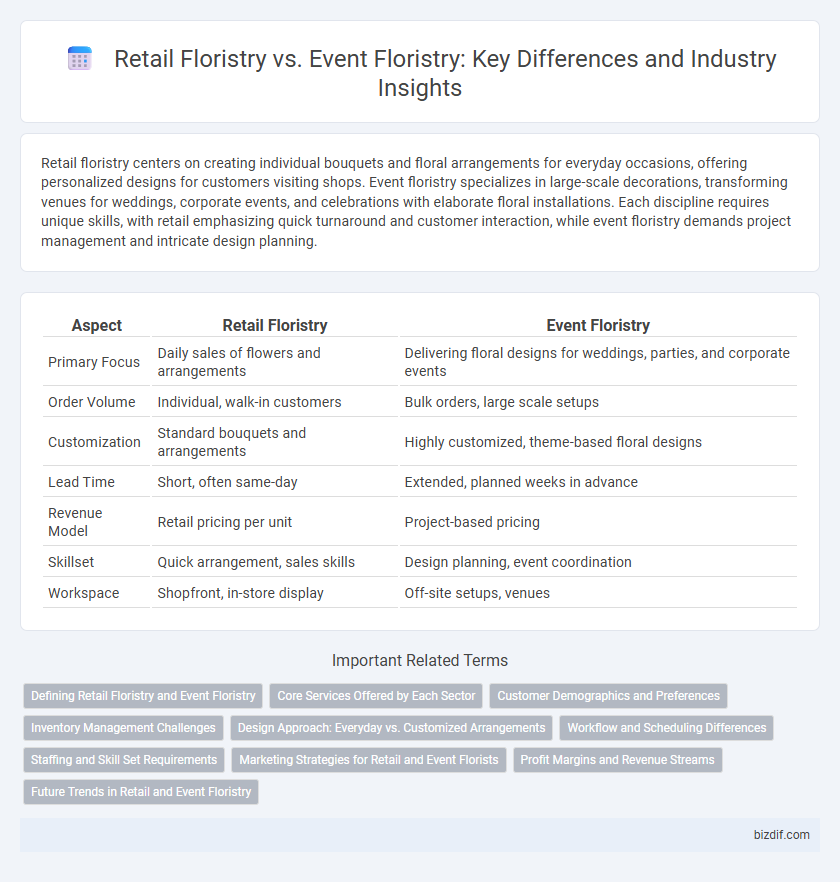Retail floristry centers on creating individual bouquets and floral arrangements for everyday occasions, offering personalized designs for customers visiting shops. Event floristry specializes in large-scale decorations, transforming venues for weddings, corporate events, and celebrations with elaborate floral installations. Each discipline requires unique skills, with retail emphasizing quick turnaround and customer interaction, while event floristry demands project management and intricate design planning.
Table of Comparison
| Aspect | Retail Floristry | Event Floristry |
|---|---|---|
| Primary Focus | Daily sales of flowers and arrangements | Delivering floral designs for weddings, parties, and corporate events |
| Order Volume | Individual, walk-in customers | Bulk orders, large scale setups |
| Customization | Standard bouquets and arrangements | Highly customized, theme-based floral designs |
| Lead Time | Short, often same-day | Extended, planned weeks in advance |
| Revenue Model | Retail pricing per unit | Project-based pricing |
| Skillset | Quick arrangement, sales skills | Design planning, event coordination |
| Workspace | Shopfront, in-store display | Off-site setups, venues |
Defining Retail Floristry and Event Floristry
Retail floristry centers on creating and selling pre-arranged bouquets, floral gifts, and individual stems directly to customers for everyday occasions, holidays, and personal use. Event floristry specializes in designing and executing large-scale floral installations and arrangements tailored for weddings, corporate events, and special celebrations, emphasizing customization and thematic coherence. Both sectors require expertise in flower selection, preservation techniques, and aesthetic design but operate within distinct marketing and customer engagement frameworks.
Core Services Offered by Each Sector
Retail floristry primarily focuses on offering ready-made bouquets, potted plants, and seasonal flowers for everyday occasions, emphasizing personalized customer service and convenient in-store or online purchasing options. Event floristry specializes in custom floral designs tailored for weddings, corporate functions, and large-scale celebrations, providing services such as venue decoration, theme-based arrangements, and intricate floral installations. Both sectors require expertise in flower selection and care, but event floristry demands advanced skills in design coordination and logistical planning to meet specific client requirements.
Customer Demographics and Preferences
Retail floristry primarily attracts individual consumers seeking floral arrangements for personal occasions such as birthdays, anniversaries, and home decor, often favoring ready-made bouquets and mixed flower varieties. Event floristry caters to corporate clients and large-scale celebrations like weddings and galas, demanding customized, themed designs and bulk orders with specific floral preferences aligned to event aesthetics. Understanding these distinct customer demographics and preferences enables florists to tailor their marketing strategies and inventory to optimize sales and client satisfaction.
Inventory Management Challenges
Retail floristry demands precise inventory management to handle perishable flowers with varying shelf lives, requiring frequent stock turnover and careful temperature control to minimize waste. Event floristry faces challenges in forecasting exact flower quantities and coordinating timely deliveries, as demand fluctuates with event schedules and bespoke arrangements. Both sectors must integrate real-time inventory tracking systems to optimize stock levels and ensure flower freshness.
Design Approach: Everyday vs. Customized Arrangements
Retail floristry emphasizes everyday floral designs that are versatile and ready-made to accommodate frequent consumer purchases, featuring popular seasonal blooms arranged for immediate display or gifting. Event floristry focuses on customized arrangements tailored to specific themes, venues, and client preferences, incorporating unique floral combinations and intricate designs to enhance special occasions. The retail approach prioritizes consistency and convenience, while event floristry requires artistic flexibility and personalized creativity to achieve distinctive aesthetics.
Workflow and Scheduling Differences
Retail floristry involves managing a consistent flow of customer orders daily, requiring efficient inventory control and rapid arrangement production to meet walk-in and online demand. Event floristry demands extensive advance planning, coordination with clients and vendors, and flexible scheduling to accommodate large-scale installations and last-minute changes. Workflow in retail centers on quick turnaround and multitasking, whereas event floristry focuses on detailed project timelines and team collaboration for successful execution.
Staffing and Skill Set Requirements
Retail floristry demands staff skilled in customer service, daily arrangement creation, and inventory management to handle walk-in clients effectively. Event floristry requires a team with expertise in large-scale design, time-sensitive installations, and collaboration with event planners for weddings and corporate functions. Both sectors benefit from floral design knowledge, but event floristry often involves advanced skills in structural mechanics and creative problem-solving under pressure.
Marketing Strategies for Retail and Event Florists
Retail florists leverage local SEO, social media advertising, and loyalty programs to attract repeat customers and drive foot traffic to physical stores. Event florists focus on building partnerships with wedding planners and venues, showcasing portfolio highlights on visual platforms like Instagram and Pinterest, and engaging in seasonal promotions to target high-demand event periods. Both segments emphasize personalized customer experiences but tailor marketing channels to their distinct client bases and purchase behaviors.
Profit Margins and Revenue Streams
Retail floristry typically generates steady profit margins through high-volume sales of individual bouquets and potted plants, benefiting from consistent foot traffic and repeat customers. Event floristry offers higher revenue streams per project by designing bespoke floral arrangements for weddings and corporate events, though profit margins can fluctuate due to customization costs and seasonal demand. Understanding these differences allows florists to optimize pricing strategies and diversify income sources for greater financial stability.
Future Trends in Retail and Event Floristry
Retail floristry is increasingly integrating e-commerce platforms and augmented reality for personalized bouquet customization, driving convenience and enhanced customer engagement. Event floristry is shifting toward sustainable practices, utilizing locally sourced and seasonal flowers to meet growing ecological consciousness among clients. Both sectors are embracing technology and eco-friendly trends to innovate floral design and delivery, shaping the future landscape of floristry.
Retail floristry vs Event floristry Infographic

 bizdif.com
bizdif.com